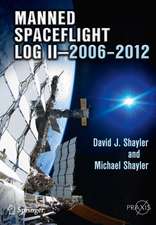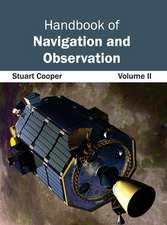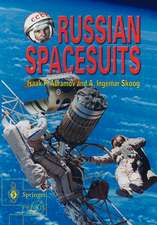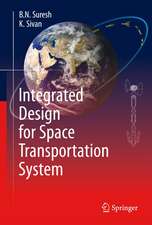Walking in Space: Springer Praxis Books
Editat de David Shayleren Limba Engleză Paperback – 3 iun 2004
Din seria Springer Praxis Books
-
 Preț: 294.46 lei
Preț: 294.46 lei -
 Preț: 223.45 lei
Preț: 223.45 lei -
 Preț: 193.12 lei
Preț: 193.12 lei -
 Preț: 167.85 lei
Preț: 167.85 lei -
 Preț: 288.98 lei
Preț: 288.98 lei -
 Preț: 323.74 lei
Preț: 323.74 lei -
 Preț: 401.38 lei
Preț: 401.38 lei -
 Preț: 264.12 lei
Preț: 264.12 lei - 8%
 Preț: 513.00 lei
Preț: 513.00 lei -
 Preț: 190.01 lei
Preț: 190.01 lei -
 Preț: 218.16 lei
Preț: 218.16 lei -
 Preț: 312.06 lei
Preț: 312.06 lei - 17%
 Preț: 414.04 lei
Preț: 414.04 lei -
 Preț: 216.41 lei
Preț: 216.41 lei -
 Preț: 264.35 lei
Preț: 264.35 lei -
 Preț: 167.63 lei
Preț: 167.63 lei -
 Preț: 284.81 lei
Preț: 284.81 lei -
 Preț: 259.08 lei
Preț: 259.08 lei -
 Preț: 305.47 lei
Preț: 305.47 lei -
 Preț: 244.14 lei
Preț: 244.14 lei -
 Preț: 227.85 lei
Preț: 227.85 lei -
 Preț: 285.25 lei
Preț: 285.25 lei -
 Preț: 295.56 lei
Preț: 295.56 lei -
 Preț: 357.17 lei
Preț: 357.17 lei -
 Preț: 275.79 lei
Preț: 275.79 lei -
 Preț: 257.08 lei
Preț: 257.08 lei -
 Preț: 349.71 lei
Preț: 349.71 lei -
 Preț: 272.45 lei
Preț: 272.45 lei -
 Preț: 270.27 lei
Preț: 270.27 lei - 8%
 Preț: 456.51 lei
Preț: 456.51 lei -
 Preț: 352.34 lei
Preț: 352.34 lei - 8%
 Preț: 394.80 lei
Preț: 394.80 lei -
 Preț: 320.65 lei
Preț: 320.65 lei -
 Preț: 325.29 lei
Preț: 325.29 lei -
 Preț: 253.11 lei
Preț: 253.11 lei -
 Preț: 192.86 lei
Preț: 192.86 lei -
 Preț: 313.40 lei
Preț: 313.40 lei -
 Preț: 150.51 lei
Preț: 150.51 lei -
 Preț: 233.34 lei
Preț: 233.34 lei -
 Preț: 286.78 lei
Preț: 286.78 lei -
 Preț: 212.01 lei
Preț: 212.01 lei -
 Preț: 366.83 lei
Preț: 366.83 lei -
 Preț: 299.99 lei
Preț: 299.99 lei -
 Preț: 232.27 lei
Preț: 232.27 lei -
 Preț: 284.58 lei
Preț: 284.58 lei -
 Preț: 212.45 lei
Preț: 212.45 lei -
 Preț: 159.81 lei
Preț: 159.81 lei -
 Preț: 349.48 lei
Preț: 349.48 lei - 20%
 Preț: 2061.61 lei
Preț: 2061.61 lei
Preț: 262.27 lei
Nou
Puncte Express: 393
Preț estimativ în valută:
50.18€ • 52.40$ • 41.53£
50.18€ • 52.40$ • 41.53£
Carte disponibilă
Livrare economică 14-28 martie
Livrare express 28 februarie-06 martie pentru 115.74 lei
Preluare comenzi: 021 569.72.76
Specificații
ISBN-13: 9781852337100
ISBN-10: 1852337109
Pagini: 382
Ilustrații: XXX, 382 p.
Dimensiuni: 170 x 250 x 28 mm
Greutate: 0.61 kg
Ediția:2004
Editura: SPRINGER LONDON
Colecția Springer
Seriile Springer Praxis Books, Space Exploration
Locul publicării:London, United Kingdom
ISBN-10: 1852337109
Pagini: 382
Ilustrații: XXX, 382 p.
Dimensiuni: 170 x 250 x 28 mm
Greutate: 0.61 kg
Ediția:2004
Editura: SPRINGER LONDON
Colecția Springer
Seriile Springer Praxis Books, Space Exploration
Locul publicării:London, United Kingdom
Public țintă
Popular/generalCuprins
Dedication.- Foreword by Dr. Jeffery A. Hoffman.- Authors preface.- Acknowledgements, glossary, notes.- List of tables.- List of illustrations.- Prologue.- Theory put to the test.- Gemini pioneering the technique.- Planning for EVA.- Tools of the trade.- Practise makes perfect.- Surface exploration.- Service calls.- Helping Hubble.- Station support.- Constructing ISS.- Next steps.- Conclusion.- Appendix, Bibliography and references, Index.
Recenzii
From the reviews:
"Shayler’s book provides a step by step account of the development of this extraordinary technique and the technology that supports it. … It is well researched and referenced, includes a bibliography and an index, and is illustrated with black-and-white photos. A significant addition is the appendix … . This book provides a comprehensive overview and analysis of space walking and represents a useful addition to the literature." (International Space Review, September, 2005)
"This book is a concise account of the development of the techniques of extra vehicular activity, more commonly known as EVA or ‘space walks’. … tends to provide a good description of the EVA’s associated with the various space programmes. … This book meets all the high quality standards … books published by Springer-Praxis over the past five years or so." (Jos Heyman, New Bulletin of the Astronautical Society of Western Australia, Vol. 30 (3), 2004)
"David Shayler’s latest book looks at one of his favourite subjects, extra vehicular activity, and it shows. It covers all aspects of EVA in both the American and Russian programmes. … It has a large number of illustrations, technical drawings and a complete record of all EVAs. … This is an essential book for those who are interested in space walks, the technology as well as Moon walks." (Rex Hall, Spaceflight, Vol. 47 (5), 2005)
"David Shayler’s account of the history of extravehicular activity (EVA) is an authoritative tightly packed inventory … . The minutiae of detail are remarkable. The book has obviously been researched to a high degree … . This is more a book for someone seriously interested in the subject … . it is absolutely packed with information, and with its well presented 170 illustrations it is very readable. … All in all, an excellent and definitive reference book on the subject … ." (John Masters, Astronomy & Space, February,2005)
"Shayler’s book provides a step by step account of the development of this extraordinary technique and the technology that supports it. … It is well researched and referenced, includes a bibliography and an index, and is illustrated with black-and-white photos. A significant addition is the appendix … . This book provides a comprehensive overview and analysis of space walking and represents a useful addition to the literature." (International Space Review, September, 2005)
"This book is a concise account of the development of the techniques of extra vehicular activity, more commonly known as EVA or ‘space walks’. … tends to provide a good description of the EVA’s associated with the various space programmes. … This book meets all the high quality standards … books published by Springer-Praxis over the past five years or so." (Jos Heyman, New Bulletin of the Astronautical Society of Western Australia, Vol. 30 (3), 2004)
"David Shayler’s latest book looks at one of his favourite subjects, extra vehicular activity, and it shows. It covers all aspects of EVA in both the American and Russian programmes. … It has a large number of illustrations, technical drawings and a complete record of all EVAs. … This is an essential book for those who are interested in space walks, the technology as well as Moon walks." (Rex Hall, Spaceflight, Vol. 47 (5), 2005)
"David Shayler’s account of the history of extravehicular activity (EVA) is an authoritative tightly packed inventory … . The minutiae of detail are remarkable. The book has obviously been researched to a high degree … . This is more a book for someone seriously interested in the subject … . it is absolutely packed with information, and with its well presented 170 illustrations it is very readable. … All in all, an excellent and definitive reference book on the subject … ." (John Masters, Astronomy & Space, February,2005)
Textul de pe ultima copertă
On 18 March 1965, just four years after Yuri Gagarin became the first man in space Alexei Leonov left his Voskhod 2 spacecraft and became the first person to perform a space walk. It was on 20 July 1969 that Neil Armstrong took his giant leap for mankind onto the surface of the moon. Then on 7 February 1984 Bruce McCandless became the first human satellite as he flew an untethered manned manoeuvring unit, 300 feet from the shuttle. Five months later on 25 July 1984 Svetlana Savitskaya became the first woman to walk in space. All this was accomplished in less than 20 years.
Two decades later space walking had become an integral part of space operations and will continue be in the forefront of future manned spaceflight activity. We still await the 13th person to step on the moon and the first person to place their footprint on the red plains of Mars. But what does it take to prepare for and conduct a period of activity outside the spacecraft?
In Walking in Space David Shayler explores the development of space walking techniques and support hardware. In a comprehensive but highly readerable review the author draws upon original documentation, personal interviews and official post flight reports revealing the very personal experience of exploring space and the development of training techniques devised in the gravity environment of Earth for work in the vacuum of space, on the moon and eventually on Mars.
Two decades later space walking had become an integral part of space operations and will continue be in the forefront of future manned spaceflight activity. We still await the 13th person to step on the moon and the first person to place their footprint on the red plains of Mars. But what does it take to prepare for and conduct a period of activity outside the spacecraft?
In Walking in Space David Shayler explores the development of space walking techniques and support hardware. In a comprehensive but highly readerable review the author draws upon original documentation, personal interviews and official post flight reports revealing the very personal experience of exploring space and the development of training techniques devised in the gravity environment of Earth for work in the vacuum of space, on the moon and eventually on Mars.
Caracteristici
First comprehensive review and analysis of spacewalking techniques and activities available in book form Shows the reader how EVA techniques have developed from the first such activities in the 1960s to the important role that these are playing today in the ongoing construction of the international space station Brings to life for the first time the meticulous training needed for the hubble space telescope servicing missions, and the careful execution of the EVAs carried out during those missions, widely agreed to be the most complex of such operations ever successfully completed Includes firsthand accounts of EVAs obtained from personal interviews with astronauts who have actually carried out EVAs, thus conveying to the reader what such a unique experience is really like



















